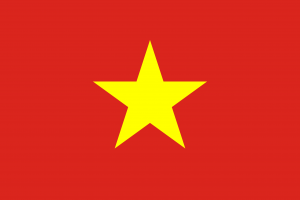Language/Vietnamese/Grammar/Future-Tense
Hi Vietnamese learners! 😊
In this lesson, we will discuss the future tense. We will learn how to form and use it correctly in Vietnamese sentences. We will also provide some cultural insights and examples to make the lesson more interesting!
Don't hesitate to use this guide to practice and improve your Vietnamese level. To enhance your learning experience, we encourage you to use resources such as Find native speakers and ask them any questions. You can also visit the Polyglot Club website, where you can find a lot more resources to help you improve your Vietnamese skills. Let's get started!
The Future Tense in Vietnamese[edit | edit source]
The future tense in Vietnamese is used to describe actions or states that will take place in the future. To form the future tense, we use the auxiliary verb "sẽ" which means "will". We then add the base form of the main verb after "sẽ".
For example:
| Vietnamese | Pronunciation | English |
|---|---|---|
| Tôi sẽ đi đến trường | Template:$tOj sel yi dDi deN troNG$ | I will go to school |
| Chúng ta sẽ gặp lại gấp | Template:$CuNG ta sel gæp laj gap$ | We will meet again soon |
| Anh ấy sẽ làm việc ở đây | Template:AN ai sel laM viec o daJ | He will work here |
In Vietnamese, the future tense is commonly used to express plans or intentions. It can also express predictions or assumptions about future events, like in the following example:
| Vietnamese | Pronunciation | English |
|---|---|---|
| Sao nói trời sẽ mưa vậy? | Template:$saW noi tROI sel muWa vaJ$ | Why do you say it's going to rain? |
To ask a question in the future tense, we simply add the question word before "sẽ". For example:
| Vietnamese | Pronunciation | English |
|---|---|---|
| Bạn sẽ đi đâu vào cuối tuần? | Template:$BăN sel dDi Dăw vao Cuoj tuwawn$ | Where will you go this weekend? |
We can also use time expressions to indicate when a future action will take place. Here are some examples:
| Vietnamese | Pronunciation | English |
|---|---|---|
| Ngày mai tôi sẽ gặp bạn | Template:Ngaj maW tOj sel gæp BăN | I will meet you tomorrow |
| Tuần sau chúng ta sẽ đi du lịch | Template:Tuwawn saW CuNG ta sel y du lijch | We will go on vacation next week |
| Lúc 7 giờ tối nay anh ấy sẽ đến | Template:Luwk băj giW toi naj AN ai sel deN | He will arrive tonight at 7pm |
Remember that Vietnamese often omits the subject when it is clear from the context, so you will find many examples where the subject is missing. However, it is always recommended to include the subject to avoid ambiguity.
Cultural Insights[edit | edit source]
As we have learned, the future tense is used to talk about the future. In Vietnam, the future can be a topic that is approached with optimism, hope, or even superstition, depending on the context and the cultural beliefs. Here are some cultural insights related to the future in Vietnam:
- Many Vietnamese parents choose the name of their children based on the day they were born. This is because, according to Vietnamese beliefs, each day of the week represents a different element and has different meanings, which can influence the character and destiny of a person. Therefore, parents can choose a name that is considered auspicious, depending on the elements of their child's birth day. - In Vietnam, it is common to consult a fortune teller, particularly during important events like weddings or business transactions. The fortune teller can give advice about the best course of action, based on the alignment of the stars, the Chinese zodiac, and other mystical beliefs. Many Vietnamese people believe that the future can be predicted or influenced by external factors, and they may take precautions or rituals to avoid bad luck or curses. - In Vietnamese culture, the future is often associated with the concept of "vạn sự tùy duyên", which means "10,000 things depend on fate". This means that many events are beyond our control, and that destiny plays an important role in our lives. Therefore, some Vietnamese people may feel more fatalistic or resigned to their future, while others may try to change it through their actions or merits.
Examples in Dialogue[edit | edit source]
To give you a better understanding of the future tense, here is a short dialogue between two friends:
- Huy: Bạn sẽ làm gì vào cuối tuần này? (What will you do this weekend?)
- Linh: Tôi sẽ đi xem phim và ăn tối với gia đình tôi. Còn bạn thì sao? (I will go to watch a movie and have dinner with my family. What about you?)
- Huy: Tôi sẽ đi chơi cùng bạn bè. Có thể đi chơi nước ngoài. (I will go out with my friends. Maybe we will go abroad.)
- Linh: Thật tuyệt đấy! Mơ ước của tôi cũng là được đi du lịch ở nước ngoài một lần. (That's great! My dream is also to travel abroad once.)
- Heading 2
Add more content...
- Heading 3
Add more content...
- Heading 4
Add more content...
- Heading 3
Add more content...
- Heading 2
Add more content...
Sources[edit | edit source]
- Vietnamese Grammar: Past, Present and Future Tenses (with Audio ...
- Vietnamese verbs – YourVietnamese
- Vietnamese/Tense - Wikibooks, open books for an open world
Videos[edit | edit source]
Learn Vietnamese - Past, Present & Future Tense - YouTube[edit | edit source]
Other Lessons[edit | edit source]
- Ask Questions
- Gender
- Personal pronouns
- Tenses
- Articles
- How to Use Have
- Nouns
- Plurals
- Questions
- Give your Opinion

